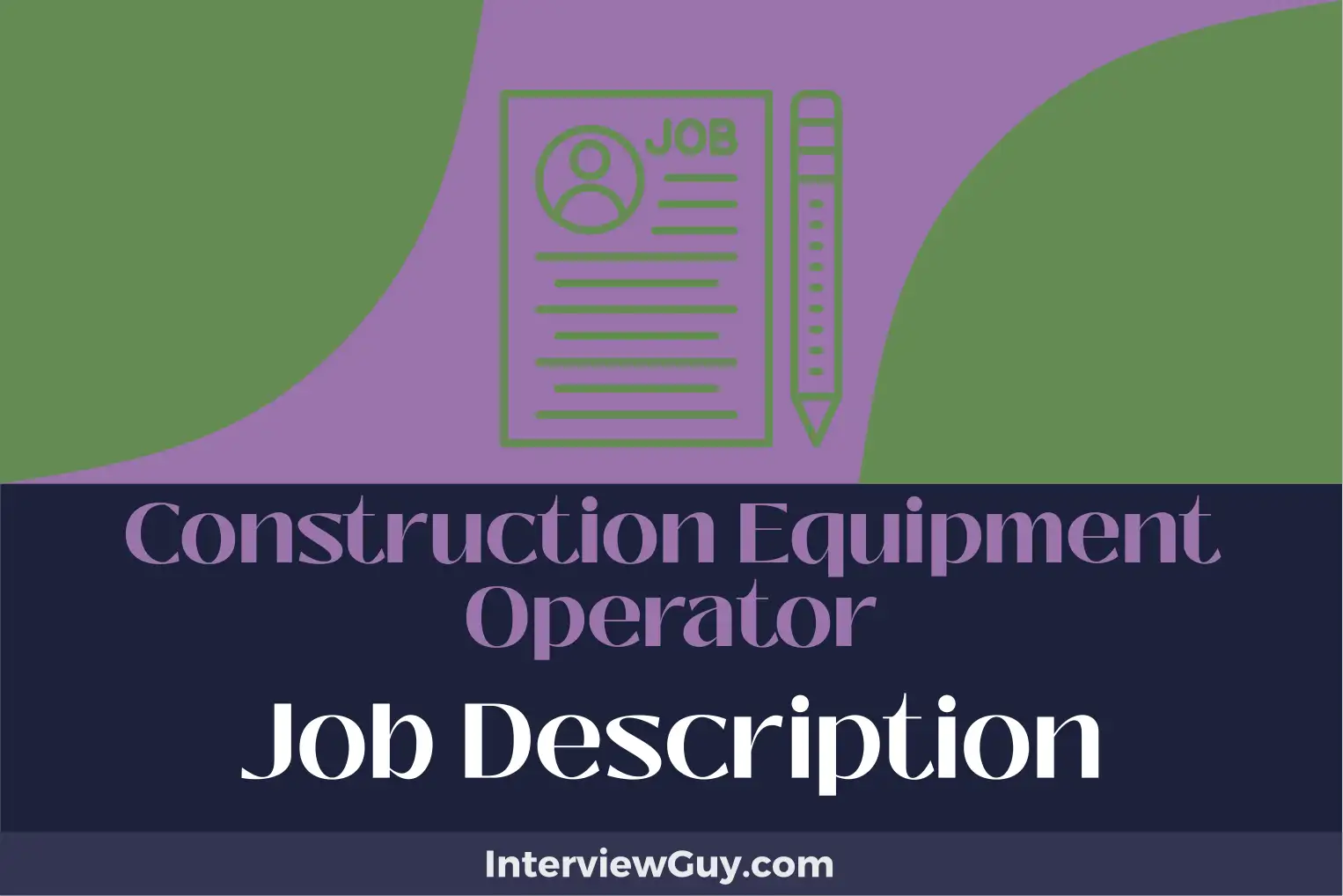Construction Equipment Operator Job Description [Updated for 2026]

In the era of rapid urbanization, the demand for skilled construction equipment operators has never been higher.
With every new project, the call for proficient operators who can handle, maneuver, and maintain our construction machinery gains momentum.
But let’s delve deeper: What’s truly expected from a construction equipment operator?
Whether you are:
- A job seeker trying to comprehend the core of this role,
- A hiring manager outlining the perfect candidate,
- Or simply curious about the intricacies of construction equipment operation,
You’re in the right place.
Today, we introduce a customizable construction equipment operator job description template, designed for easy posting on job boards or career sites.
Let’s delve right into it.
Construction Equipment Operator Duties and Responsibilities
Construction Equipment Operators handle heavy machinery and equipment used in construction sites.
They ensure the machines are operated in a safe and efficient way to support the completion of construction projects.
Their main duties and responsibilities include:
- Operate various types of heavy construction equipment such as bulldozers, cranes, excavators, loaders, and graders
- Perform pre-operational checks for fuel, hydraulic fluid, and oil levels and ensure equipment is in good working condition
- Read and interpret site plans, diagrams, and maps to plan the best way of completing tasks
- Load and unload construction materials and move them around the work site
- Execute minor repairs and maintenance on equipment, including lubricating parts and replacing worn or damaged components
- Adhere to safety protocols and standards at all times, including wearing protective gear
- Communicate effectively with team members and supervisors to ensure efficient operations
- Document daily operations and report any issues or incidents to the site supervisor
- Participate in training sessions and safety meetings as required
Construction Equipment Operator Job Description Template
Job Brief
We are in search of a skilled Construction Equipment Operator to join our construction team.
The successful candidate will be responsible for operating heavy machinery such as bulldozers, backhoes, excavators, and loaders.
The Construction Equipment Operator’s duties include performing regular maintenance checks on machinery, following safety regulations, and loading and unloading construction materials.
The ideal candidate will have experience operating construction machinery and have a keen attention to detail.
Responsibilities
- Operate heavy machinery to perform construction tasks
- Adhere to safety guidelines and protocols at all times
- Regularly perform maintenance checks on machinery
- Load and unload construction materials
- Communicate with team members to ensure tasks are completed on schedule
- Prepare construction sites as needed
- Observe and report any issues with the equipment
- Follow instructions given by the construction team
Qualifications
- Proven work experience as a Construction Equipment Operator
- Knowledge of construction procedures, equipment, and OSH guidelines
- Ability to read and interpret blueprints
- Excellent physical condition and stamina
- High school diploma or equivalent
- Valid license to operate construction equipment
Benefits
- 401(k)
- Health insurance
- Dental insurance
- Retirement plan
- Paid time off
- Professional development opportunities
Additional Information
- Job Title: Construction Equipment Operator
- Work Environment: Outdoor construction sites. This role often requires long hours, and weekend or evening work may be necessary to meet project deadlines.
- Reporting Structure: Reports to the Construction Site Supervisor or Project Manager.
- Salary: Salary is based upon candidate experience and qualifications, as well as market and business considerations.
- Pay Range: $35,000 minimum to $60,000 maximum
- Location: [City, State] (specify the location or indicate if remote)
- Employment Type: Full-time
- Equal Opportunity Statement: We are an equal opportunity employer and value diversity at our company. We do not discriminate on the basis of race, religion, color, national origin, gender, sexual orientation, age, marital status, veteran status, or disability status.
- Application Instructions: Please submit your resume and a cover letter outlining your qualifications and experience to [email address or application portal].
What Does a Construction Equipment Operator Do?
Construction Equipment Operators work in the construction industry where they operate heavy machinery that is used to construct buildings, roads, bridges, and other structures.
They are responsible for operating equipment such as bulldozers, forklifts, backhoes, dump trucks, and other types of machinery that move earth, materials, or heavy objects around construction sites.
Their tasks include loading and unloading materials, digging trenches, compacting earth, and clearing and leveling construction sites.
Construction Equipment Operators also perform routine inspections and maintenance on their equipment to ensure it is safe to use and in good working order.
This may include lubricating parts, replacing worn or damaged components, and repairing any mechanical problems.
They must also adhere to safety procedures to prevent workplace accidents.
For example, they must ensure the area around their equipment is clear before starting operations and follow best practices for lifting and moving loads.
In addition to their equipment operation duties, they may also be involved in site planning and preparation, including reading and interpreting blueprints and site plans, marking out site boundaries and other important locations, and coordinating their work with other construction professionals.
Construction Equipment Operators must be skilled in managing and controlling their machinery, have a good understanding of construction processes and safety standards, and be able to work effectively as part of a team.
Construction Equipment Operator Qualifications and Skills
A proficient construction equipment operator should possess the following qualifications and skills:
- Operational knowledge of various types of construction equipment including but not limited to bulldozers, backhoes, cranes, loaders, and excavators.
- Understanding of safety regulations and procedures in construction environments to ensure the safety of themselves and their co-workers.
- Mechanical skills to perform basic maintenance and troubleshoot equipment issues.
- Physical fitness and endurance to operate heavy machinery for extended periods, and in potentially harsh weather conditions.
- Attention to detail to follow specific instructions and perform precise maneuvers with heavy equipment.
- Coordination skills to efficiently operate heavy machinery, often performing several tasks simultaneously.
- Ability to communicate clearly with team members, supervisors, and other on-site personnel to ensure the smooth progress of construction projects.
- Problem-solving skills to quickly and effectively resolve any issues that may arise with the equipment or during the construction process.
Construction Equipment Operator Experience Requirements
Construction Equipment Operators typically gain their initial experience through vocational training programs or apprenticeships, where they learn to operate various types of construction machinery under direct supervision.
Entry-level construction equipment operators often have at least 1 to 2 years of hands-on experience, often from internships, part-time roles, or on-the-job training.
These individuals should have a strong knowledge of basic machinery operation, maintenance, and safety protocols.
Candidates with more than 3 years of experience often have worked on various construction sites and are proficient in operating different types of heavy equipment like bulldozers, cranes, or backhoes.
They may also have advanced skills like equipment troubleshooting and repair.
Those with more than 5 years of experience are usually highly skilled and may have leadership experience, with the ability to supervise other operators, plan and coordinate work, and ensure adherence to safety standards.
They may be ready for roles such as Construction Foreman or Site Supervisor.
Additional certifications from recognized industry bodies, such as the National Commission for the Certification of Crane Operators (NCCCO), can enhance job prospects and demonstrate a higher level of competence and experience.
Construction Equipment Operator Education and Training Requirements
Construction Equipment Operators typically require a high school diploma or equivalent qualification for entry-level positions.
Many operators learn their trade through an apprenticeship program which can last for three or four years.
These programs, sponsored by trade associations and unions, offer a combination of technical instruction and hands-on practical training.
Operators are trained in the use of many types of construction equipment, including bulldozers, cranes, graders, excavators and others.
They also learn about safety procedures, machine maintenance and simple repairs.
In addition, many states require construction equipment operators to have a commercial driver’s license to transport their equipment to various job sites.
Although not obligatory, some operators may pursue certification in a specific type of equipment.
This is particularly true for those operating cranes, which often necessitates professional certification.
Continuing education is also important in this field, as technology and equipment continually evolve.
Operators should be willing to update their skills throughout their career.
Experience in the field is highly valued, and many operators start out as construction laborers or helpers before moving into equipment operation roles.
Construction Equipment Operator Salary Expectations
The average wage for a Construction Equipment Operator is $48,160 (USD) per year.
However, the actual earnings can vary widely based on factors such as the level of experience, the complexity of the machinery being operated, geographical location, and the hiring company.
Construction Equipment Operator Job Description FAQs
What skills does a Construction Equipment Operator need?
Construction Equipment Operators should possess excellent coordination and mechanical skills to operate heavy machinery effectively.
They need good visual and auditory abilities to ensure safety and precision at the construction site.
In addition, they should have basic math skills for measurements and calculations, and problem-solving abilities to deal with equipment malfunctions or unexpected site conditions.
Do Construction Equipment Operators need a degree?
Construction Equipment Operators typically don’t need a degree, but a high school diploma or equivalent is often required.
Most of the training is on-the-job, although some operators may choose to attend a vocational school or community college to learn the basics.
Many states require operators to obtain a commercial driver’s license to drive the equipment to job sites.
What should you look for in a Construction Equipment Operator’s resume?
A Construction Equipment Operator’s resume should include details about their experience in operating different types of heavy machinery and any relevant certifications they hold, like a commercial driver’s license.
Look for a strong safety record and a history of adhering to deadlines.
Knowledge of basic repair and maintenance for heavy equipment can also be advantageous.
What qualities make a good Construction Equipment Operator?
A good Construction Equipment Operator is safety-conscious, understanding the importance of adhering to safety protocols and regulations to prevent accidents.
They should be dependable, able to work in various weather conditions, and flexible with their work hours as construction work can often extend beyond regular office hours.
Good physical stamina is also important as operators may need to sit for long periods or perform manual labor.
Is it difficult to hire Construction Equipment Operators?
Hiring Construction Equipment Operators can be challenging due to the specific skills and physical requirements of the job.
It’s important to offer competitive wages and benefits, as well as a safe and respectful work environment to attract and retain skilled operators.
Conclusion
There you have it.
Today, we’ve given you a detailed look at what it truly means to be a Construction Equipment Operator.
And guess what?
It’s not just about operating heavy machinery.
It’s about building the foundations of our modern world, one project at a time.
With our handy Construction Equipment Operator job description template and real-world examples, you’re ready to take the next step.
But don’t stop now.
Dig deeper with our job description generator. It’s your ideal tool for creating detailed job listings or perfecting your resume.
Remember:
Every construction project is a part of the bigger picture.
Let’s build that world. Together.
How to Become a Construction Equipment Operator (Complete Guide)
The Weirdest of Work: Unusual Jobs That Exist
The AI Job Shift: What’s Next for Human Careers?
Workday Wretchedness: The Most Hated Jobs Known to Man
Unbelievable But True: Easy Jobs That Will Fill Your Wallet Without Draining Your Energy

![Bookkeeping Manager Job Description [Updated for 2026]](https://interviewguy.com/wp-content/uploads/2024/04/bookkeeping-manager-job-description-768x512.png)
![Corporate Hotel Manager Job Description [Updated for 2026]](https://interviewguy.com/wp-content/uploads/2024/05/corporate-hotel-manager-job-description-768x512.webp)
![Data Infrastructure Engineer Job Description [Updated for 2026]](https://interviewguy.com/wp-content/uploads/2024/05/data-infrastructure-engineer-job-description-768x512.webp)


![Freight Broker Job Description [Updated for 2026]](https://interviewguy.com/wp-content/uploads/2024/02/freight-broker-job-description-768x512.webp)